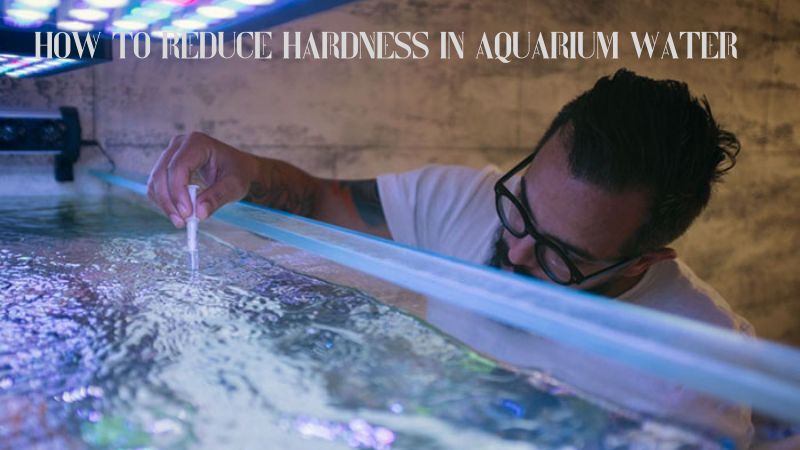Choosing the right water for your aquarium is crucial for the health and well-being of your fish. Many aquarium owners wonder whether distilled or spring water for fish tank is the best option for their fish tank. Each type of water has its own benefits and drawbacks, and understanding them can help you make the best decision for your aquatic pets. In this article, FishLoverZone explore the key differences between distilled or spring water for fish tank and determine which is better suited for your aquarium.
1. Understanding Distilled Water for Fish Tanks

Distilled water is water that has been purified through the process of distillation. This involves boiling the water and collecting the steam, which is then condensed back into liquid form. The process removes most of the dissolved minerals, chemicals, and impurities from the water.
Benefits of Using Distilled Water
Purity: Distilled water is free from contaminants such as chlorine, heavy metals, and other harmful chemicals, making it extremely clean and pure.
Customizable Water Parameters: Since distilled water lacks minerals, you can add the appropriate minerals and buffers based on the specific needs of your fish.
Drawbacks of Using Distilled Water
Lack of Essential Minerals: Distilled water does not contain any of the natural minerals like calcium, magnesium, and potassium that are necessary for a healthy aquarium ecosystem. Fish, plants, and beneficial bacteria all require these minerals to thrive.
Need for Additives: If you use distilled water in your tank, you will need to remineralize it by adding aquarium-safe minerals and buffers to create a balanced environment for your fish.
2. Understanding Spring Water for Fish Tanks
Spring water is natural water that has been sourced from underground springs. It contains natural minerals and has not undergone the distillation process, which means it retains many of the elements that are removed in distilled water.
Benefits of Using Spring Water
Contains Natural Minerals: Unlike distilled water, spring water contains essential minerals that fish need for proper health and development. These minerals help to maintain the stability of the water’s pH, KH (carbonate hardness), and GH (general hardness) levels.
More Natural Environment: Spring water mimics the natural environment of many freshwater fish, providing a more balanced and stable ecosystem.
Less Need for Additives: Since spring water contains natural minerals, it often requires fewer adjustments to water parameters, depending on the fish species you’re keeping.
Drawbacks of Using Spring Water
Variability in Water Quality: The quality of spring water can vary greatly depending on the source. Some spring water may contain high levels of minerals that could raise the water hardness or pH too high for certain fish species.
Potential Contaminants: Spring water may still contain contaminants like nitrates, phosphates, or even harmful chemicals depending on the source, so it’s important to test the water before using it in your aquarium.

3. Distilled or Spring Water For Fish Tank is Better for Your Fish Tank?
When it comes to choosing between distilled or spring water for your fish tank, the answer depends on your specific needs and the species of fish you’re keeping.
Use Distilled Water If
- You need complete control over the water parameters and are comfortable adding the necessary minerals and buffers to remineralize the water.
- You have fish that require soft, low-mineral water, such as certain species of tetras or discus, which thrive in environments with low hardness.
Use Spring Water If
- You’re looking for a more natural option that already contains essential minerals, making it easier to maintain balanced water conditions.
- You have fish that thrive in water with moderate hardness and a balanced mineral content, such as goldfish, guppies, or cichlids.
- You want to avoid adding too many chemicals or supplements to the water.
4. How to Prepare Your Water for the Fish Tank
Regardless of whether you choose distilled or spring water, it’s essential to test and adjust the water to meet the needs of your fish:
Testing: Always use an aquarium test kit to check for pH, GH, KH, ammonia, nitrate, and nitrite levels before adding water to your tank.
Remineralization: If you’re using distilled water, purchase an aquarium-specific remineralizer to add the necessary minerals. Follow the instructions to ensure proper dosing.
Water Changes: When doing water changes, mix the distilled or spring water with treated tap water to maintain stable water parameters.
Conclusion
Both distilled or spring water for fish tank can be suitable for fish tanks, depending on the specific needs of your fish and the conditions of your tank. Distilled water offers purity and control, while spring water provides natural minerals and a more balanced ecosystem. The key is to understand the requirements of your fish and ensure the water you use meets those needs. With proper preparation and care, both types of water can help you create a healthy and thriving aquarium.





